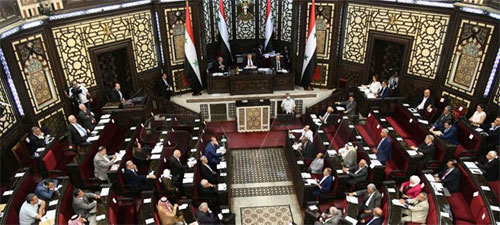During a session chaired by Hammouda Sabbagh, the People’s Assembly approved a draft law overseeing the money exchange profession. The new draft amends some of the provisions of Law 24 for 2006 and Law 29 for 2017, regarding money exchanges, that became law. The amendment dealt with articles related to settling the status of exchange institutions, as well as the branches they are allowed to keep open and the possibility of opening new branches, provided that capital is increased. It also allows for the transfer of funds between branches belonging to the same company within Syria. It is permitted for exchange shops to agree among themselves, with exchange companies working inside Syria, to distribute exchanges coming from abroad to those companies, in accordance with the provisions of the Monetary and Credit Board.
Commenting on the draft law, Finance Minister Maamoun Hamdan said that the measure aims to give exchange institutions time to settle their situations in light of the national economy and the need for them to simplify their services to residents in all governorates by increasing branches, offices and capital, with oversight from the Monetary and Credit Board and Central Bank.
The session saw members of the Assembly pose numerous questions to the Finance Minister. They stressed the need for the government to remain transparent with citizens over the falling exchange rate of the pound to the dollar, and to clarify the reasons and measures taken to control the collapse. They demanded a quick emergency solution to meet citizens’ needs.
The Finance Minister explained that the major rise is not completely due to economic reasons, and that there are a number of reasons are behind what happened. Among them are the manipulation of the exchange rate, speculation and rumors that drive people to buy foreign currencies, gold or real estate. He affirmed that the government is studying the issue and its implications for citizens, adding that there are measures expected in this regard and everyone should cooperate to hinder smuggling, which has damaged the national economy.
Regarding the impact of the exchange rate on goods, he clarified that the prices of goods that are subsidized by the electronic cards will not be affected by what is happening, including imported sugar and rice. Those products are available in large quantities, and the government has ensured that their prices would not rise by adding them to the smart card system until the end of the year. Other items will be added to the smart card later. He stressed that the government did not put forward one dollar in the market, and is working to direct foreign currencies to the needs of the electricity, oil and wheat sectors, which need foreign spending in accordance with the plans mentioned in the general state budget currently being implemented.
This article was translated and edited by The Syrian Observer. The Syrian Observer has not verified the content of this story. Responsibility for the information and views set out in this article lies entirely with the author.


